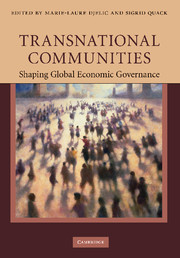Book contents
- Frontmatter
- Contents
- List of figures
- List of tables
- List of appendices
- Contributors
- Preface
- Part I Introduction
- Part II Classical communities with a transnational extension
- Part III Professional communities with a transnational extension
- Part IV Virtual communities
- Part V Transnational interest- or issue-based communities
- 11 The transnational temperance community
- 12 Industrial democracy in the European Community: trade unions as a defensive transnational community, 1968–1988
- 13 The making of a comprehensive transnational discourse community trade unions as a defensive transnational community, 1968–1988
- 14 Global warming, transnational communities, and economic entrepreneurship: the case of carbon capture and storage (CCS)
- 15 Communities of practice as cause and consequence of transnational governance: the evolution of social and environmental certification
- Part VI Conclusion
- Index
- References
12 - Industrial democracy in the European Community: trade unions as a defensive transnational community, 1968–1988
Published online by Cambridge University Press: 07 September 2010
- Frontmatter
- Contents
- List of figures
- List of tables
- List of appendices
- Contributors
- Preface
- Part I Introduction
- Part II Classical communities with a transnational extension
- Part III Professional communities with a transnational extension
- Part IV Virtual communities
- Part V Transnational interest- or issue-based communities
- 11 The transnational temperance community
- 12 Industrial democracy in the European Community: trade unions as a defensive transnational community, 1968–1988
- 13 The making of a comprehensive transnational discourse community trade unions as a defensive transnational community, 1968–1988
- 14 Global warming, transnational communities, and economic entrepreneurship: the case of carbon capture and storage (CCS)
- 15 Communities of practice as cause and consequence of transnational governance: the evolution of social and environmental certification
- Part VI Conclusion
- Index
- References
Summary
In recent years social scientists and historians alike have emphasized increasingly that national political systems, economies, and societies cannot be understood in isolation from their international environment (Osterhammel 2001; Djelic and Quack 2003). The growing prominence of such concepts as transnational governance (Djelic and Sahlin-Andersson 2006) or the network society (Castells 2000) is indicative of this trend. In the field of European Union studies – the more particular context of this chapter – a similar tendency has led scholars to focus on the “informal politics” (Middlemas 1995) of the EU's multi-level governance system, which is characterized by constant communication and negotiation between supranational, national, and regional policy-makers and non-governmental groups. Studies of transnational networks ranging from the Christian Democrats (Kaiser 2007) to competition lawyers (van Waarden and Drahos 2002) have demonstrated the innovative potential of this approach. However, as emphasized by Mayntz in this volume, most contributions in these literatures concentrate on relational processes of exchange and negotiation, and pay less attention to the “community” aspect of transnational governance, that is, the bonds of shared values, knowledge or skills that underlie processes of transnational group formation.
In this chapter I explore this community aspect in relation to trade unions in the European Community between the late 1960s and late 1980s, and more specifically, their involvement in European debates about industrial democracy.
- Type
- Chapter
- Information
- Transnational CommunitiesShaping Global Economic Governance, pp. 282 - 304Publisher: Cambridge University PressPrint publication year: 2010
References
- 3
- Cited by



